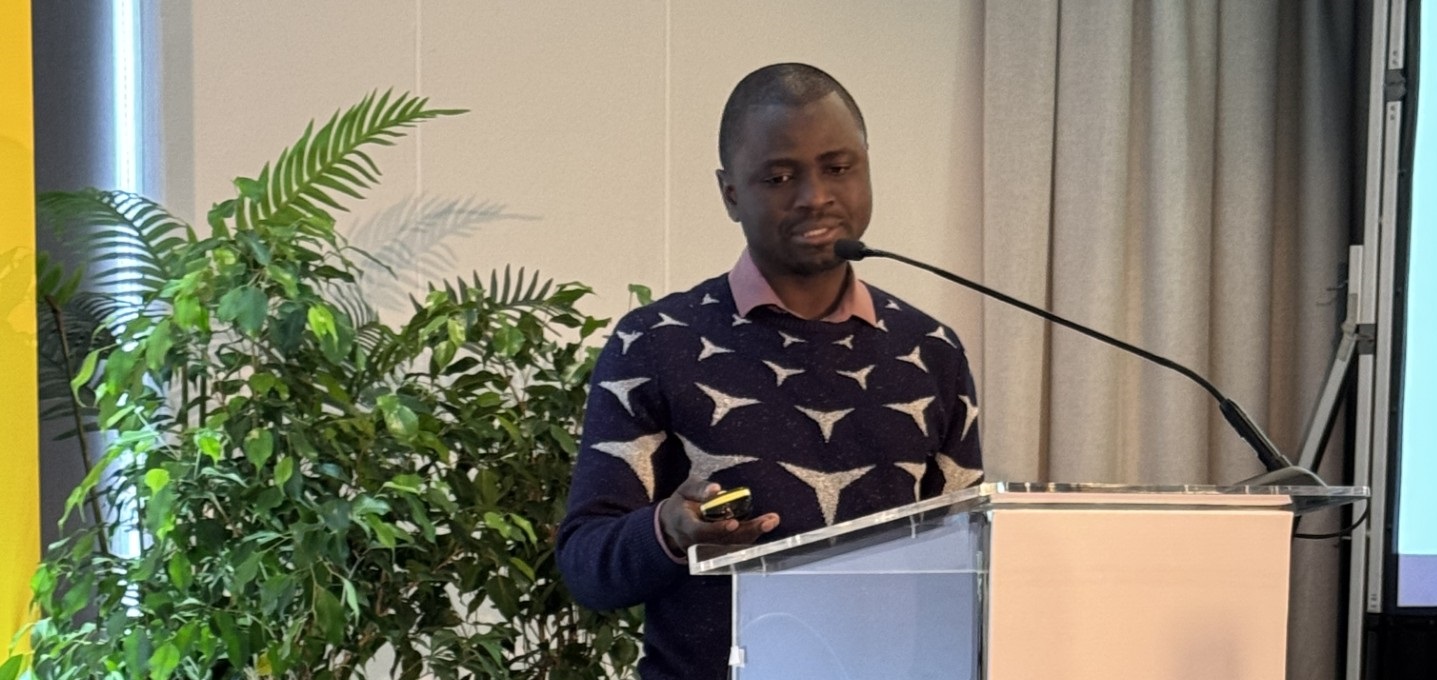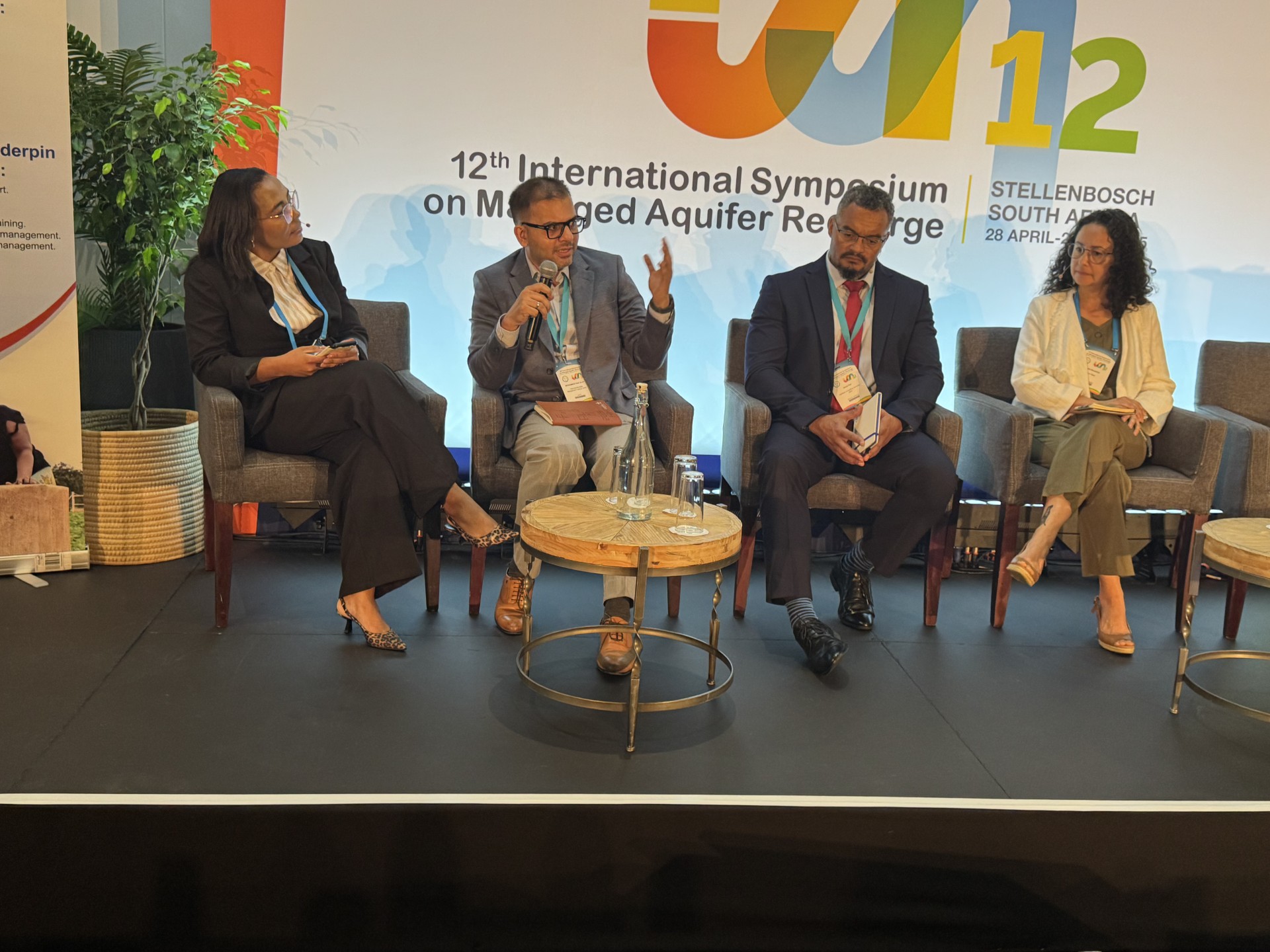From L-R: Ms Anna David – SADC-GMI Senior Groundwater Specialist, Dr Mohammed Faiz Alam- Regional Researcher, International Water Management Institute, Delhi, David Farr – Senior Environmental Hydrogeologist – Wellfield Consulting Services – Botswana, and Daniela Benedicto Van Dalen Senior Hydrogeologist and Strategic Partnership Advisor – Acacia Water
Managed Aquifer Recharge: A Critical Solution for Water Scarcity in Africa
As the world grapples with escalating water scarcity exacerbated by climate change, the significance of Managed Aquifer Recharge (MAR) has never been more pronounced. This critical insight emerged during the 12th International Symposium on Managed Aquifer Recharge, held in Stellenbosch, South Africa, from April 28 to May 2, 2025.
The SADC Groundwater Management Institute (SADC-GMI) actively participated in the symposium, hosting a pivotal “MAR in Africa” session on April 29, 2025, focusing specifically on the SADC region.
Setting the Stage for MAR in Africa
Ms. Anna David, Senior Groundwater Specialist at SADC-GMI, opened the session by underscoring the critical role of MAR in addressing water scarcity, supporting agriculture, and enhancing food security across the African continent, particularly the SADC region. She highlighted the necessity for innovative and sustainable methods to manage aquifer recharge effectively. Ms. David emphasized the importance of cross-learning, advocating for knowledge exchange from regions with successful MAR practices.
Keynote Insights on Water Scarcity
In his keynote address, Mr. Mikael Ndongo, Chief Hydrogeologist from Namibia’s Ministry of Agriculture, Fisheries, Water and Land Reform and the SADC-GMI National Focal Person, painted a stark picture of the challenges posed by water scarcity, arid climates, and variable rainfall patterns. He articulated that these factors necessitate MAR as a strategic approach to bolster groundwater resources. “As awareness of groundwater’s role in resilience and development grows, MAR is becoming an essential part of Africa’s long-term water management strategies,” stated Mr. Ndongo.

Mr. Mikael Ndongo, Chief Hydrogeologist from Namibia’s Ministry of Agriculture, Fisheries, Water and Land Reform, was delivering a keynote presentation during the session.
Engaging Stakeholders for Success
The session culminated in a dynamic panel discussion featuring esteemed experts, including Dr. Mohammed Faiz Alam from the International Water Management Institute, David Farr from Wellfield Consulting Services, and Daniela Benedicto Van Dalen from Acacia Water.
Daniela Benedicto Van Dalen stressed the importance of stakeholder engagement when implementing MAR initiatives, asserting that understanding the benefits of MAR schemes is crucial for their success. She advocated for a bottom-up approach, emphasizing the need for community involvement and buy-in to ensure project sustainability. The bottom-up approach empowers communities and increases the likelihood of successful project implementation, as initiatives are more likely to meet the specific needs of the populations they serve.
Dr. Mohammed Faiz Alam highlighted the urgent need to manage depleted groundwater resources effectively. He pointed out that MAR could serve as a sustainable solution if implemented correctly, drawing parallels with Southern Asia, where groundwater management is vital for irrigation and climate change adaptation.
David Farr raised a critical concern regarding project failures due to a lack of understanding of community needs. He urged that MAR initiatives must align with identified local requirements to enhance their relevance and effectiveness. Farr also cautioned against a one-size-fits-all approach, advocating for tailored solutions that resonate with the specific needs of the communities involved.
Data Sharing: A Barrier to Success
A significant issue discussed was the lack of data sharing among SADC Member States, which hampers effective project implementation. “Aquifers know no boundaries, making it imperative for SADC Member States to unite to address the pressing water challenges impacting approximately 395 million people in the region”, stated David Farr. He further said the interconnected nature of aquifers means that water resources are shared across borders, necessitating a collaborative approach to sustainable management. As climate change exacerbates water scarcity, the urgency of a coordinated response becomes increasingly evident. By working together, SADC countries can develop comprehensive strategies that enhance water availability and promote equitable access for all communities. This collaboration can lead to implementing innovative Managed Aquifer Recharge (MAR) techniques, which have shown promise in replenishing groundwater supplies and improving resilience against droughts.
Conclusion
The discussions at the symposium highlighted that while Managed Aquifer Recharge presents a promising solution to water scarcity in Africa, its success hinges on innovative practices, stakeholder engagement, and effective data sharing. As the continent faces increasing water challenges, the collaborative efforts of SADC-GMI and other stakeholders will be crucial in harnessing the full potential of MAR to secure water resources for future generations.





